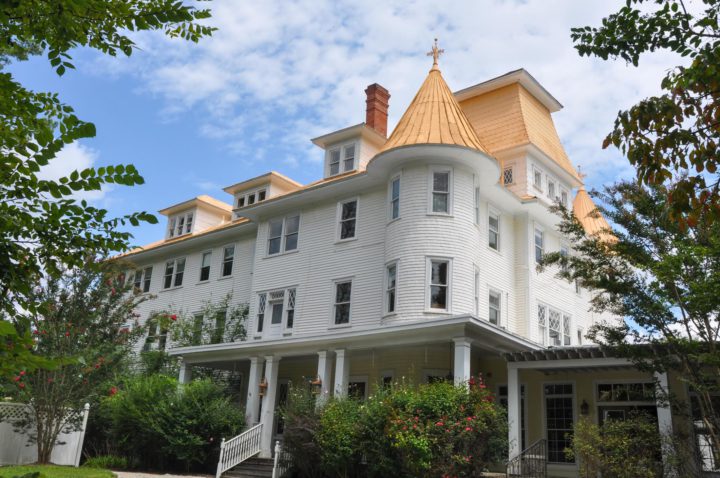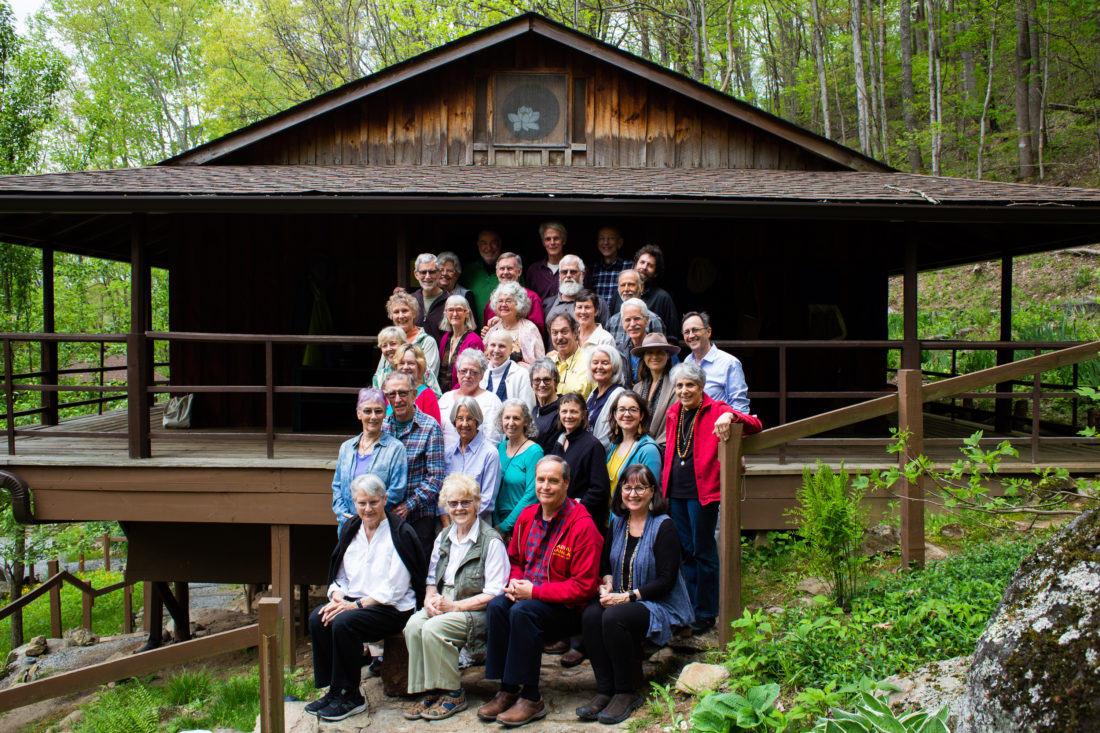Local meditation teacher Ronya Banks believes anxiety is on the rise, and recent data support her hunch. On May 20, for example, the American Psychiatric Association reported the results of a new poll which showed that, “For the second year in a row, about two in three Americans say they are extremely or somewhat anxious about keeping themselves and their family safe, paying bills and their health.”
And on the same day, the APA flagged another trend in how Americans view factors affecting feelings of psychological well-being: social media use. In another of the group’s polls, the majority of adult respondents said social media have a more negative than positive effect on mental health.
“People are not looking up, and they’re not taking in the beauty and the miracles and the gifts,” Banks says. At the same time, hours spent online every day produce “a lot of negativity and drama surrounding politics and a lot of fear around the environment,” she says.
Putting our cellphones down is hard; after all, we don’t describe those frequent peeks at our screens as an addiction for nothing. Maybe that’s why local centers report that the silent meditation retreat business is booming. Ranging from a single day to a full two weeks off the grid, the retreats eliminate unnecessary external stimulation by emphasizing meditation, maintaining an inward focus — and, yes, disconnecting from all tech devices.
Spirit of place
Meditation hasn’t always been hot. When Californians Elizabeth Kent and Melinda Guyol arrived in the Western North Carolina mountains 40 years ago, they were seeking a cooler climate and meaningful work.
“I told my cousin we were going to have a meditation retreat, and the retreat would be held in silence,” recalls Kent, who at 82 now lives in West Asheville.
“He looked at me and he said, ‘You’re not going to make any money.’”
But their center, located on 140 acres outside Hot Springs, would eventually draw hundreds of spiritual seekers eager to take a break from regular life. On April 25, Southern Dharma celebrated its 40-year anniversary with both founders on site. Guyol, who now lives in Davis, Calif., journeyed to WNC for the first time since the early 1990s for the event.
As the two women set out to develop the remote property in 1979, the challenges were many. From planning and overseeing the construction of the retreat buildings to maintaining the mile-long gravel access road and developing mailing lists of prospective visitors, every day seemed to require learning a new skill or troubleshooting an unforeseen complication.
Even the word “dharma” in the center’s name proved problematic, since most people hadn’t heard it before — and found it hard to spell. Simply stated, Kent says, “It’s a search for the truth.” That truth “has many paths to get to the same human transformation,” she continues, and Southern Dharma from the beginning has invited retreat teachers from different paths, including Buddhist, Christian, Jewish, Sufi and Taoist traditions.
After a slow start, the concept began to take off toward the end of the 1980s. Now, nearly all the center’s retreats are full, Kent says, with many hopeful attendees on waiting lists.
“I always had faith in meditation,” explains Kent. “I felt that it would just take time for people to get interested and develop a practice and go through that personal transformation that happens.”
Over time, the center’s buildings and paths have matured and mellowed, bringing new richness to the retreat experience, both founders say. “It seems that everything has grown together in a way that shows us what an extraordinarily sacred space it is,” reflects Guyol. “You can really feel it; there’s a sense of something there that’s really big and really takes care of the heart.”
The sound of silence
What, exactly, happens at a silent retreat? At Southern Dharma, those on retreat cultivate an inward focus. To that end, participants are asked to refrain from conversation with one another during the day — and even to avoid making eye contact as much as possible.
During the retreat, sessions of sitting meditation alternate with walking or moving meditation (such as yoga or qi gong practice). The center provides three vegetarian meals a day and asks guests to participate in morning chores. Accommodations are mostly in dormitory-style rooms with shared bathroom facilities; Kent says Southern Dharma has made progress in offering additional private-room options, with more in development.
If practical issues arise, guests may post a written question on a bulletin board or speak directly to a staff member. The goal isn’t to maintain absolute silence, but to reduce extraneous distractions.
Evening sessions provide an opportunity to discuss topics related to meditation and to reflect on the experiences of the day. Each participant also meets with the retreat teacher at least once during the stay for individualized discussion and guidance; longer retreats include multiple sessions with the teacher.
“You don’t come down in the morning and say, ‘Oh, how was your night? Mine was terrible. I feel pretty draggled.’ You leave all that out and just focus inward and talk outwardly when it’s appropriate,” Kent explains.
While different teachers encourage different practices, even reading and writing are often avoided to keep the focus on being present in the moment.
Unplug and reboot
Marshall’s Prama Institute isn’t very far from Southern Dharma as the crow flies, but Prama’s approach to silent retreats does differ in some ways from that of its older neighbor.
For one thing, reading is allowed — the facility even has a library — and journaling is encouraged. In general, there’s a focus on practical meditation techniques, according to staffer Howard Nemon.
“We want people to integrate and utilize the practices we are teaching more into their lives and use them as instruments for personal growth and change,” Nemon says. “All of us here are longtime practitioners of these practices. That’s how we live our lives, so that’s something we can share or transmit.
“People realize that life is so agitated and so hurried that they don’t have time to reflect internally. They’re just always extroverting,” Nemon continues. “People have told us they have gone through some emotional thing, and they just had to push through it. But it left a scar; it left something inside. These retreats really serve to give people a pause, a space. They use the word ‘reboot’ a lot.”
Participants at Prama don’t avoid eye contact and usually end up developing close bonds with one another over the course of the retreat, Nemon says.
During the day, two 90-minute yoga classes anchor the schedule, along with group meditation sessions and walking meditation in the outdoors. Following the meditation activities, leaders speak to the participants, sometimes reading poetry or prose to inspire contemplation. As at Southern Dharma, evening sessions allow for group discussion.
At the end of the event — which usually begins on a Friday evening and wraps up midday on a Sunday — the group has a sharing session. While strong emotions can come out as participants reflect on insights they’ve gained into their lives, “it usually ends on a very positive note,” Nemon says. “I don’t think anyone’s ever gone away in a negative state.”
Prama offers four or five retreats annually, a number Nemon says has grown in recent years.
Heart’s desire
Hendersonville’s Heartwood Refuge is a relative newcomer to the area’s spiritual scene. Located in the former Osceola Lake Inn off Kanuga Road, the main retreat structure — dating back to 1908 — had been abandoned for 10 years before the nonprofit Heartwood Refuge and Retreat Center purchased it three years ago, explains Amy Goldweber, the center’s director.

As the restoration process continues, Goldweber says, about 50 of the property’s 90 rooms are currently operable, and the center hosts about 20 silent retreats — ranging from one to 12 days in length — each year.
While the exact format and approach are up to the teacher leading the retreat, Goldweber says participants are urged to “really go inward and assess and reflect and contemplate” during the experience.
“When you omit one way to express yourself that you often use throughout the day, it makes you focus and concentrate on other important behaviors,” Goldweber explains.
While most who attend a silent retreat find the experience valuable, it’s not for everyone at every moment in their lives, Goldweber cautions. “There are certain situations when you shouldn’t be silent, such as after a trauma, a crisis or a great loss in life, like the death of someone very close to you,” she says.
Loving landscape
Banks has taught at all three of WNC’s retreat centers and says they’re all wonderful, drawing the word into long syllables for emphasis. “They’re all committed to self-realization and self-awareness and quietude and support and generosity,” she says.
“When you go to a place like Southern Dharma that’s been well-established, where thousands of people have been earnestly putting energy into their practice, it’s like you drop deep into your meditation practice very quickly,” Banks explains. And the natural beauty of the remote location — which she’s been visiting since the 1990s — is unique. “As far as quiet and getting away from it all, it’s definitely a cut above all the others,” she says.
Heartwood Refuge’s convenient location in Hendersonville makes accessing the retreat quick and easy, and the presence of two monastics in residence deeply grounds the facility in Buddhist spirituality and practice, Banks continues. At Prama Institute, she says, the people who run the center “ooze kindness and generosity.”
Asked what draws people to a silent retreat, Banks muses, “There has to be a really deep motivator to go sit in silence for three or more days and do this incredibly boring practice of just being aware of whatever’s arising in the present moment, including your breath.”
But the frenetic pace of modern life has many seeking relief.
“Typically, when you ask people how they are doing, the first thing they say is, ‘Good, but I’ve been so busy.’ So we are living in a society that’s addicted to being busy and efficient and to packing as much into each day as possible,” she says.
In addition to teaching at the local retreat centers, Banks also offers half-day silent retreats at her own business, Asheville Insight Meditation in Woodfin. It’s an intense experience, she says, with three periods of sitting meditation interspersed with two sessions of movement-based meditation. The half-day format fits into many schedules, and the experience offers a way to explore before committing to a longer period. For those with a regular meditation practice, the shorter retreats can serve as a way to maintain focus between multiday retreats.
“When we go on these silent retreats, the mind and heart can become more open and flexible and less rigid,” Banks says. “We are able to go back to the world with more flow and more acceptance and more compassion for all viewpoints.”




Before you comment
The comments section is here to provide a platform for civil dialogue on the issues we face together as a local community. Xpress is committed to offering this platform for all voices, but when the tone of the discussion gets nasty or strays off topic, we believe many people choose not to participate. Xpress editors are determined to moderate comments to ensure a constructive interchange is maintained. All comments judged not to be in keeping with the spirit of civil discourse will be removed and repeat violators will be banned. See here for our terms of service. Thank you for being part of this effort to promote respectful discussion.